Most People Don’t Have Transparent Salaries, So Here’s The Research on Talking About Pay

Former Director of People @ Buffer
A while back, an awesome group of women in tech in Hamburg, Germany reached out to Buffer.
They explained that they wanted to support women in being more confident about the money they make and negotiating, and asked if we would we be interested in talking about our journey with transparent salaries.
And that’s how I, with a track record of literally never negotiating and a mostly hilarious salary history that looks like this:
1st job, NYC: Conde Nast editorial asst: $26K
7 yrs @Tennessean/Gannett, Nashville: $35-$60k
Buffer: http://t.co/P8xoEmjmzm #talkpay
— Courtney Seiter (@courtneyseiter) May 1, 2015
… could ever end up in any kind of position to speak to a bunch of smart women about money and negotiating.
It’s a real testament to the power of irony.
In fact, as I told these awesome ladies, I’ve even done the opposite of negotiating. Once when I was offered a $35,000 salary, I whooped out “Wow!” in joy, while still on the phone with my future boss.
Yes. “Wow.”
But today I’m lucky enough to work at Buffer, where our values and culture have led us to work toward creating a new way to think about compensation and value.
And as a result, this is now an area I’ve spent a lot of time thinking about, researching and asking questions about.
We don’t really identify as “experts” of anything at Buffer (there’s always so much more we can learn, and a beginner’s mind is so much nicer) and I’m definitely not an expert in this area, but I am starting to feel more confident about thinking on worth, value and compensation.
At Buffer:
- There is no negotiation.
- We are paid according to a salary formula that we all know and have vetted.
- Our pay is on our website for anyone to see.
Buffer has a value of “do the right thing,” which means we try to pay enough so that teammates can focus on work and not worry about paying the bills. We also have a value of transparency, so we share everything openly, including our salaries and how they’re calculated.
Equality wasn’t the main reason for doing this at the time – our founders just wanted to create a blueprint for others coming after them – but it’s my favorite side effect of transparency.
In this way, it helps not only us but also, we hope, other founders and potential employees—especially women, people of color and other underrepresented groups.
Because I am not alone in doing a terrible job of negotiating: Women generally negotiate much less than men.
Why don’t women negotiate?
A study of graduating university students found that only 7% of female students attempted to negotiate an initial job offer as compared to 57% of men (Babcock & Laschever, 2003).
This created a starting salary difference of 7.4%—and over time, even small differences in starting salaries can lead to substantial gaps.
Especially because asking for a raise is another hurdle that can be tough for women. Another survey by Elle magazine found that 53 percent of women had never asked for a raise, compared with 40 percent of men.
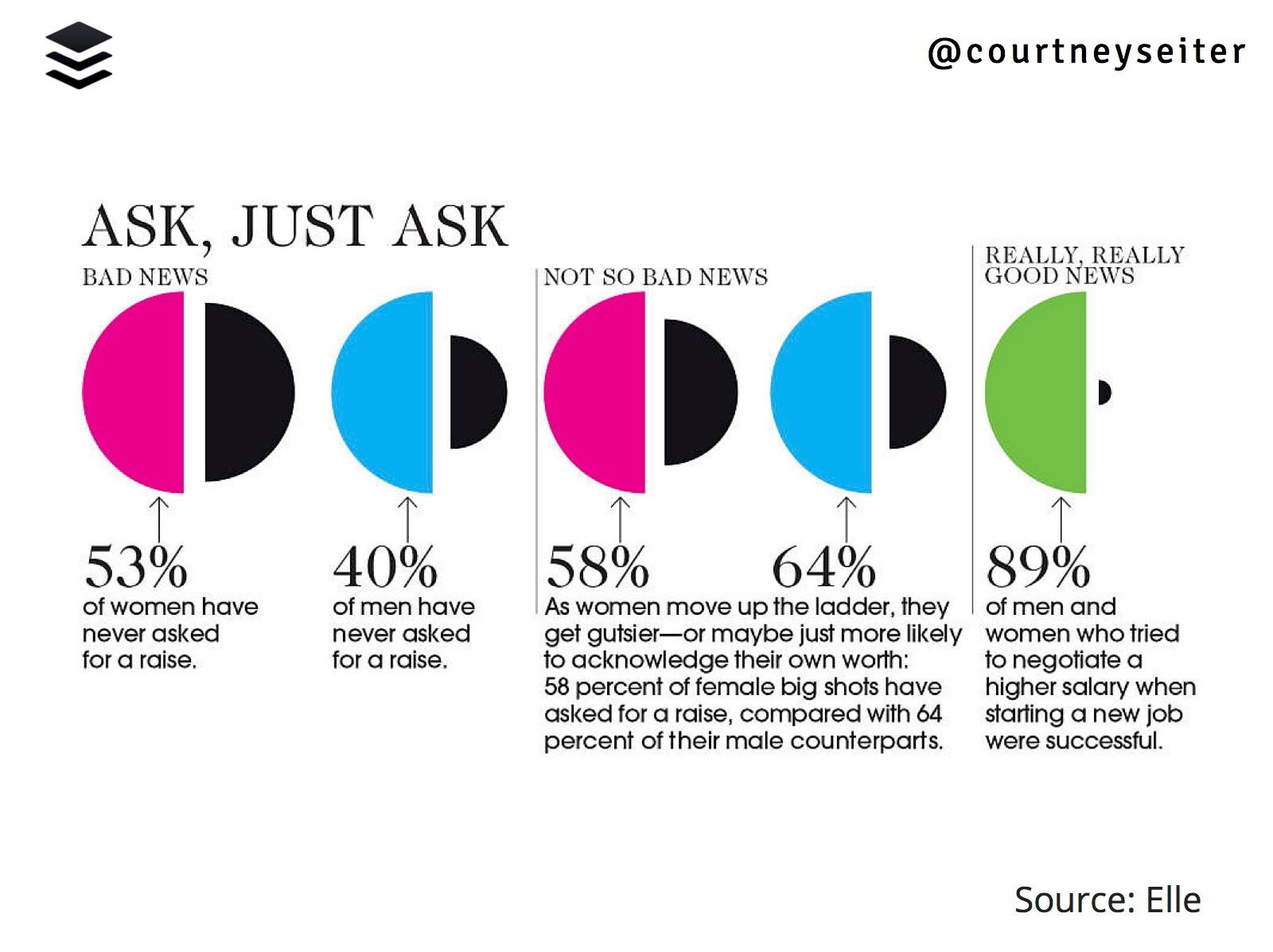
So why don’t women negotiate job offers and ask for raises? Often women worry that asking for more money will look pushy or damage their image. Research shows we’re right to have that concern.
Women who request either a raise or a higher starting salary are more likely than men to be perceived as greedy, demanding or just not very nice. Studies have shown that both male and female managers are less likely to want to work with women who negotiate during a job interview.
In one experiment by Linda Babcock, viewers watched videos of a man and a woman asking for a raise, using an identical script. Viewers liked the man and agreed that he should get a raise. The woman? She was successful in getting the money but viewers did not like her. They thought she was too demanding and aggressive.
Additionally, there’s a big cultural stigma in many places in the world attached to talking about money openly that can make things even more challenging.
How does transparency help?
All this has led us to where we are today: With more companies opening up their data and revealing unequal wages for the same work.
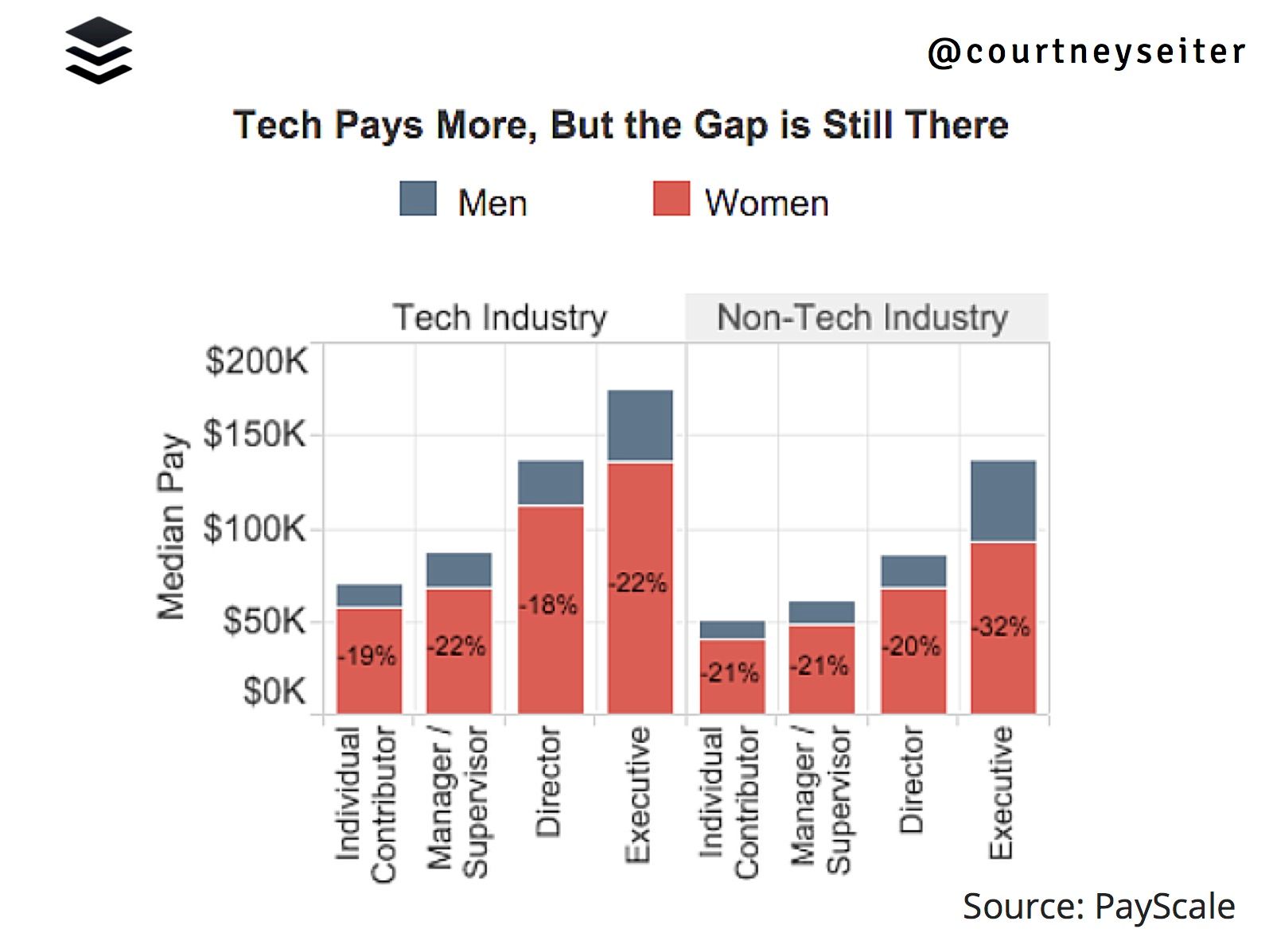
Tech companies like Pinterest, GoDaddy and Salesforce are all reviewing employee compensation data to root out gender wage gaps or other challenges to equal pay for equal work.
It’s no wonder there is growing interest in the topic of pay transparency.
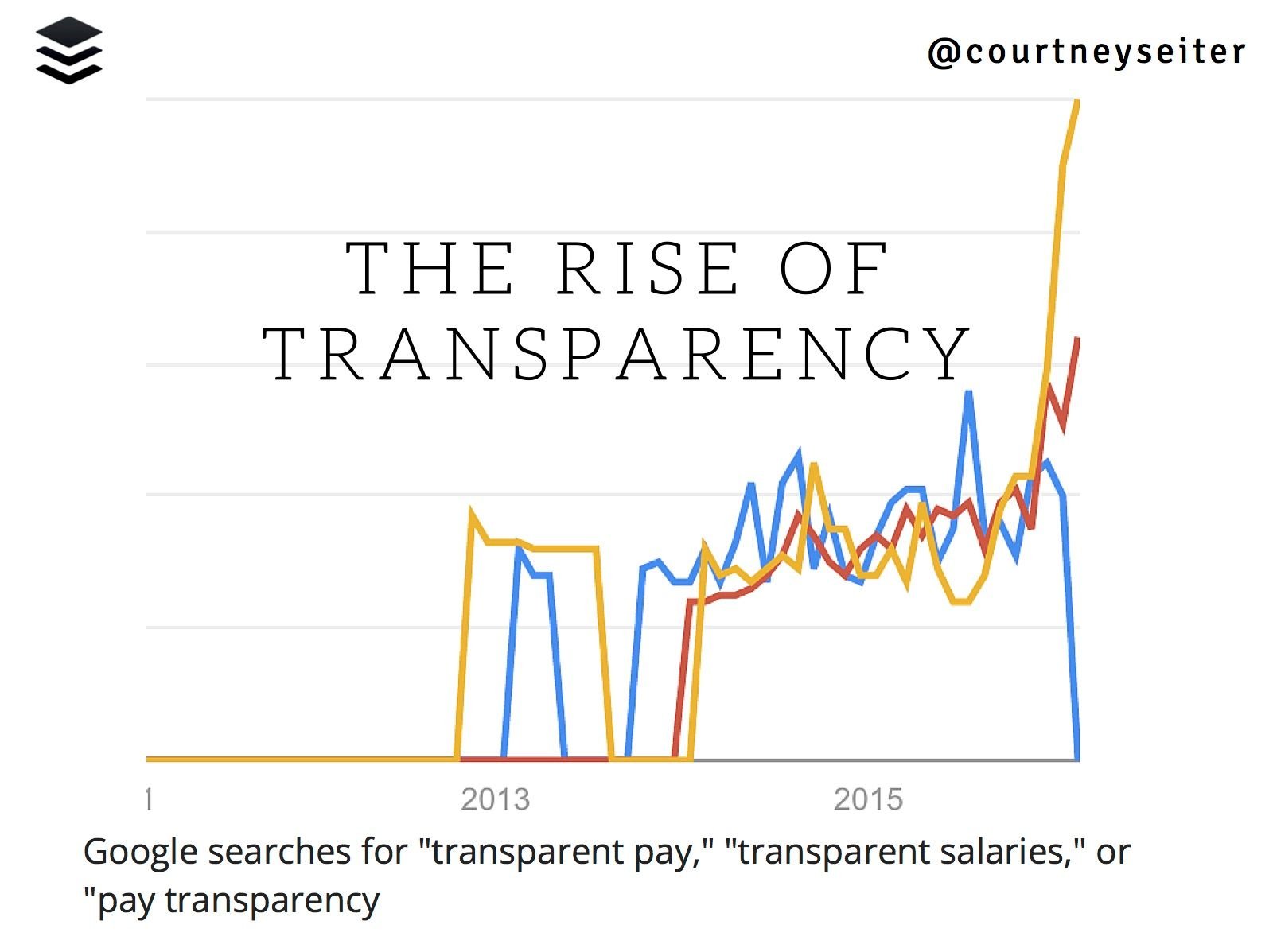
Since the beginning of Buffer, we’ve always tried to share all of our lessons and failures. Over time this has developed into one of the keystone values of the company.

There are quite a few benefits of sharing as much as we can: We have more context and get more feedback on our decisions. We create more equality. And we’ve found that transparency is a great way to build trust in a team.
We’ve done a lot of experimenting and iterating to get to our current salary formula, which looks like this:
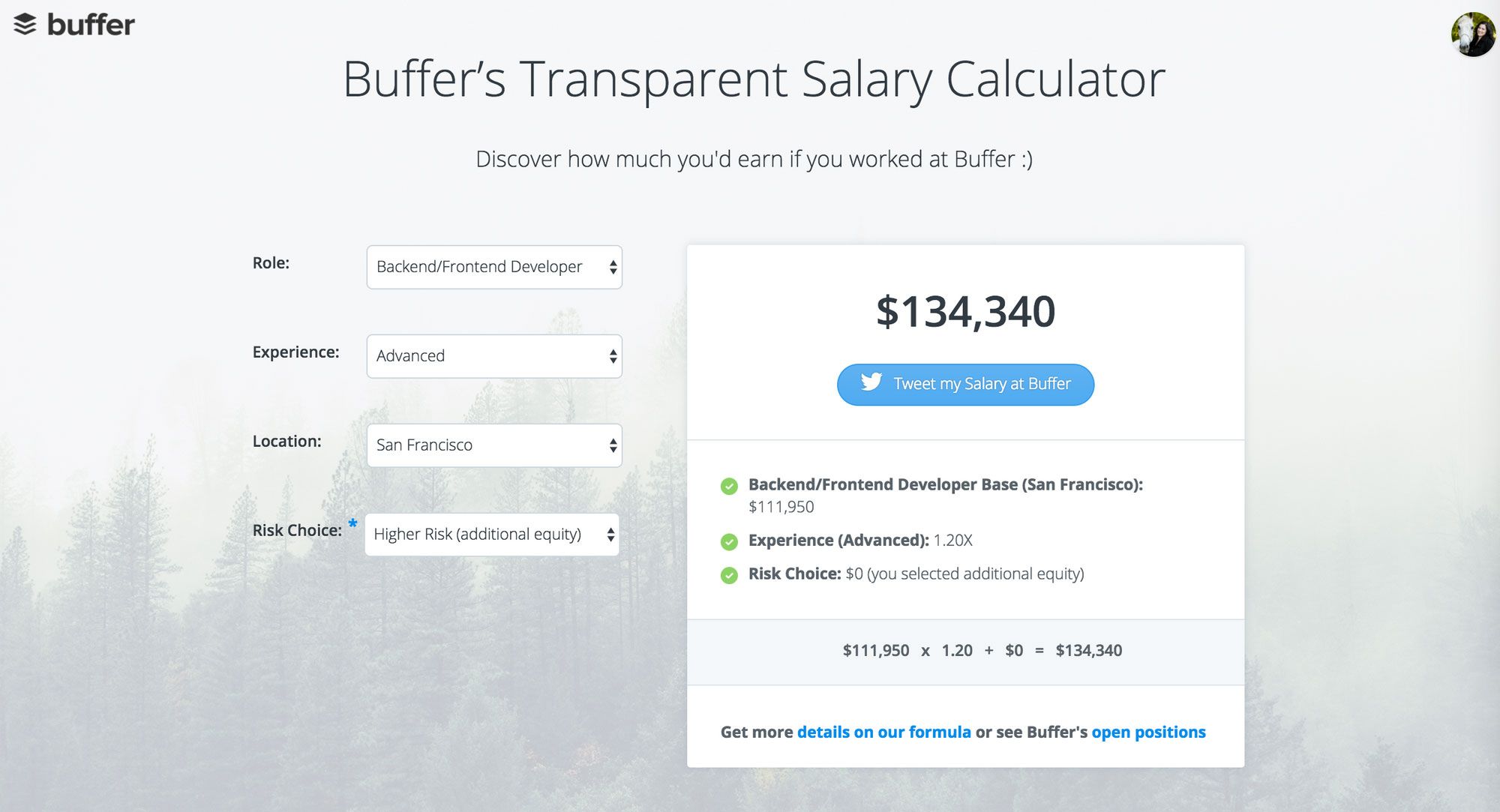
The formula is not perfect. We’re always making changes, listening to feedback and evolving it. I’m sure there will be many more evolutions of the formula over time as we grow and share thoughts and challenges.
How to talk about salary
This might work great for us at Buffer, but we know open salaries are not a possibility for the vast majority of the work world.
If you want to start a bigger conversation about worth and compensation, what do you do? What resources are available to you? Here are a few places to start:
- Friends: Start a casual conversation. Did they negotiate at their current job? If so, how? Did it work? Share numbers if you feel comfortable—this can be so illuminating, even if they’re in different industries than yours.
- Networking organizations: Find coworkers or peers in organizations within your industry you can ask. If you’re not comfortable saying that you’re doing research for yourself, you can say you have a friend looking to get into the industry.
- Recruiters: They do this for a living and likely have a good idea of ranges. Set up an informational interview and find out what they’re seeing in the job market.
- Job boards: Sometimes they’ll offer pay ranges for jobs in your field.
- Employers: When your employer asks how much salary you’re expecting, ask, “What’s the pay range for my position?” If they give you a range, tell them you’ll get back to them.
Online resources
Additionally, there’s a wealth of online resources, including salary calculators, anonymous reports about compensation and culture, and lots more. Here are a few places to check out:
- Hired’s salary calculator
- LinkedIn Salary
- Indeed’s salary search
- Glassdoor (Can even give you a peek into what’s standard at your company)
- FairyGodBoss‘s salary database
- Salary.com
- PayScale’s salary calculator
- Paysa
- CareerBliss
- Comparably
- StackOverflow’s salary calculator (See how much you’d earn if you worked at Stack Overflow)
- Buffer’s salary calculator (See how much you’d earn if you worked at Buffer)
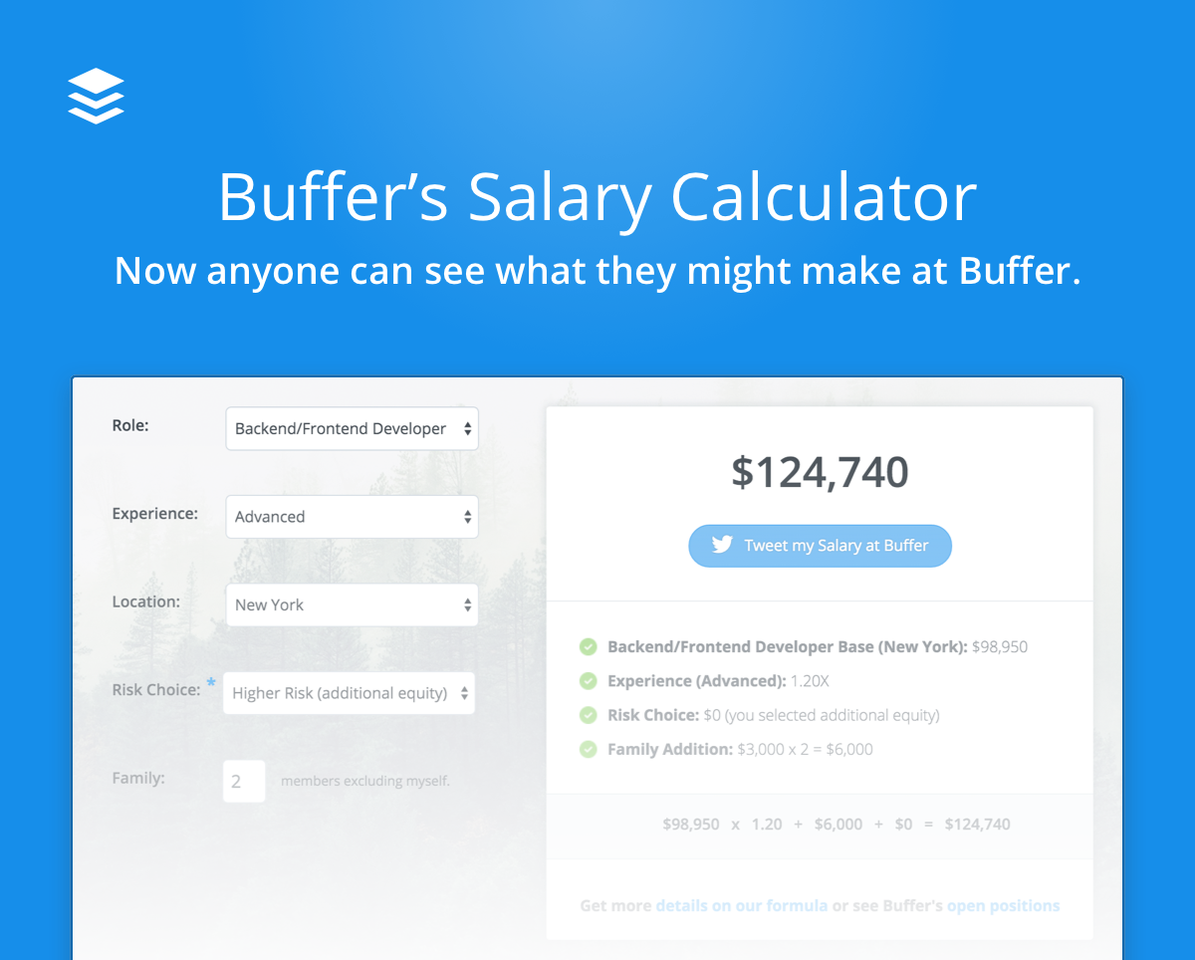
Tips for better negotiating
The better women are at negotiating (and the more often we do it), the more we’ll start to break down the biases that create these pay disparities.
And if we don’t? By not negotiating their job at the beginning of their career, women are leaving an estimated $1 million and $1.5 million on the table in lost earnings over their lifetime.
We can start by using these transparency resources to research and be informed on where you stand.
If you’re interested in a new job or asking for a raise at your existing job, you can also ask yourself a few questions to be prepared to present your case on merit:
- Have you saved your company time or money? If so, how much?
- Have you added to company profits through a client you brought on or an initiative you proposed? How much did you make the company?
- Have you exceeded the metrics your boss set when she hired you? (i.e. You were hired to increase web traffic by 100% but your projects increased traffic by 250%)
- What kind of projects have you taken on beyond the scope of your job?
- Are you the person who covers for your boss or someone else in a pinch?
There are plenty of other negotiating tips out there, but there’s one big one really stood out to me because it’s specific to women: Make it about more than you.
In an experiment at The University of Texas, men and women were asked to negotiate a starting salary for themselves, then to negotiate on behalf of someone else. When the women negotiated for themselves, they asked for an average of $7,000 less than the men. But when they negotiated on behalf of a friend, they asked for just as much money as the men.
This is called communal orientation—it’s not about me, but what I can do for you—and it can neutralize the negative consequences women can see when they negotiate. Often it’s more acceptable for women to negotiate with others in mind because it creates an impression of caregiving.
When you’re negotiating, it can work really well to think of the other people your salary supports and frame your case as supportive to the overall organization so the negotiation doesn’t seem like it’s all about you.
Over to you!
Being totally open about what you make may not be possible for everyone—yet!—but being informed about salaries and worth is possible and increasingly important for all of us, especially for women. I hope some of this information might help you start some discussion in that direction.
What are your top tips and resources for salary negotiation? I’d love to hear them all in the comments!
Try Buffer for free
180,000+ creators, small businesses, and marketers use Buffer to grow their audiences every month.
Related Articles

I've tried 57 productivity tools in the past year. These are the ones I keep coming back to.

Looking for some low-lift ways to make yourself happier? Here's some of the best research that we've found on personal happiness.

I went from occasional AI user to power user in months. How? My mindset for how to approach AI evolved. Now, I reach for AI every day. I once read that professionals aren’t going to be replaced by AI, rather, they will be replaced by other professionals who use AI. This idea that someone who leverages AI will perform better at their work is now supported by research. Harvard Business School published a paper where they compared a group of consultants using AI to another group that wasn’t using